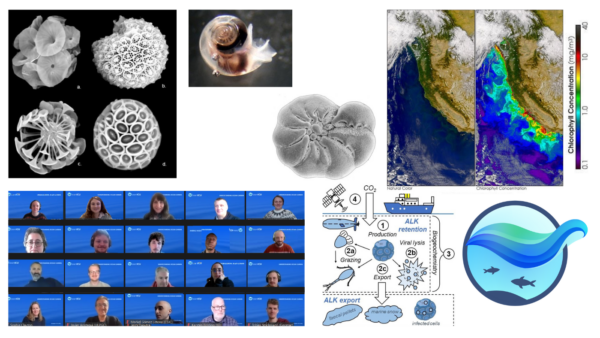
The 2024 OceanICU Annual Science Meeting took place virtually, 11-15th of March, offering a positive view of progress made during the first year and a robust platform for discussions among partners across various scientific domains concerning ocean carbon processes. Through a series of comprehensive sessions, work packages presented the latest research, as well as updates on their collaboration with other work package groups.
Key take-aways included the need for building activity chains across the project, linking new process knowledge to models, the importance of continuing dialogue with stakeholders, defining user and technical requirements for the decision support tools, identifying case studies and understanding OceanICU links with other key research programmes such as APERO, Sea02CDR, BioCarbon, IOCR and EXPORTS initiatives.
Addressing the evolving challenges in our ocean, such as deep-sea mining, expanding offshore energy, fishing, and climate change impacts, demands data for informed decision-making. OceanICU’s mission to bridge knowledge gaps in ocean carbon processes aims to equip policymakers with the necessary tools to sustain marine ecosystems. As the meeting concluded, partners expressed a collective commitment to advancing our understanding of ocean carbon and fostering interdisciplinary collaboration to tackle climate change challenges.
On day one of the ASM, we began by exploring work package 8: Connecting OceanICU to Society, with a presentation on the global distribution and valuation of the biological carbon pump by Fabio Berzaghi (WMU). Fiona Culhane (MI) provided insights from stakeholder engagement with the fishing industry, which underscored the importance of collaboration in navigating the intersection of ocean health and human activities to inform more sustainable practices, and Nathalie Van Isacker explained how OceanICU is aiming to empower broader society through shared knowledge and collaborative initiatives. Notably, in an effort to extend this knowledge to educational settings, early-career scientists will collaborate with educators to create repeatable knowledge pathways. The European Atlas of the Seas, an invaluable Ocean Literacy resource supported by the European Commission and powered by the European Marine Observation and Data Network (EMODnet) Secretariat, will be used to help teachers and other stakeholders in data visualisation.
Work Page 2 focused its session on understanding the current state of the ocean carbon cycle. This series of discussions encompassed a comprehensive examination, including a detailed analysis of time and space-varying uncertainty budgets for ocean CO2 sink estimates from observation-based products, presented by Daniel Ford (EXE). Additionally, Are Olsen (UiB) presented “In the Wake of Deeper Convection: Nonsteady State Anthropogenic Carbon in the Greenland Sea.” Finally, Pete Brown (NOC) provided insights into the short-term biological response to ocean overturning.
On the second day of the ASM, we delved into Work Package 3: Impacts of abiotic climate stressors (pH, O2& T) on the biological carbon pump. Aja Trebec from (ULPGC) provided insights into nutrient limitation and the impact of aerosols on marine plankton communities under a warming ocean. Additionally, Tobias Strickmann from GEOMAR discussed the utilisation of in situ particle imaging for assessing the influence of environmental drivers on carbon fluxes on a global scale. Ben Gustafson from HW elucidated the process of recognizing biology in the ocean’s carbonate pump, updating our understanding of pelagic calcifier roles in production and export. Lastly, Oisín Callery (NUIG) presented findings on cold water coral distribution and assessment of resilience to future ocean conditions.
During the Work Package 4 session, ecosystem controls on carbon sequestration were spotlighted in Sophie Clayton (NOC) presentation exploring the particle size-remineralization feedback through a global data synthesis approach. Pedro Afonso (IMAR) traced the potential carbon transfer via megafauna diving behaviour in the open ocean, while Markel Gomez Letona (CSIC) estimated oxygen utilisation rates in the mesopelagic ocean. Finally, Andre Visser (DTU) discussed valuing carbon sequestration by Antarctic krill faecal pellets.
On Wednesday, Dave Reid (MI) and Matthias Haeckel (GEOMAR) provided an overview of Work Package 5: Impacts of Fishing and Industrial Extraction Processes on the Ocean Carbon carbon cycle. Matthias provided insights into sediment plumes from polymetallic nodule mining trials, offering intriguing perspectives on deep-sea mining. Paula Silvar (MI) followed with a presentation on carbon flux in the Irish Sea, while David Reid (MI) shared updates from the ICES Workshop on Fish Carbon. Douglas Spears (US) concluded the session by showcasing a strategic modelling tool for ecosystem-based fisheries management.
Work Package 6 lead, Iris Kreist (GEOMAR) focused a presentation on determining the significance of key processes in the evolving ocean carbon cycle. Jorn Bruggemann and Karsten Bolding (BB) explained the state of the FABM framework, while Jerry Blackford (PML) delved into shelf carbon budgets and process sensitivities. Momme Butenschön (CMCC) presented on carbon cycle representation in BFM, and Ken H Andersen from DTU introduced the FEISTY model of fish in the carbon cycle. Marion Bezaud (CEA) wrapped up the session with a presentation on the development of a global NEMO-PISCES configuration with a regional zoom over the North Atlantic.
The Work Package 7 update focused on the DSTs for Ocean Carbon Management by Patrizio Mariani (DTU), who also elaborated on Earth system model emulators for carbon export, while Jorn Bruggeman (BB) presented early examples of process-based DSTs.
Addressing the evolving challenges in our ocean, such as deep-sea mining, expanding offshore energy, and climate change impacts, demands robust data for informed decision-making. OceanICU’s mission to bridge knowledge gaps in ocean carbon dynamics aims to equip policymakers with the necessary tools to safeguard marine ecosystems. As the meeting concluded, participants expressed a collective commitment to advancing our understanding of ocean carbon and fostering interdisciplinary collaboration to tackle climate change challenges.
